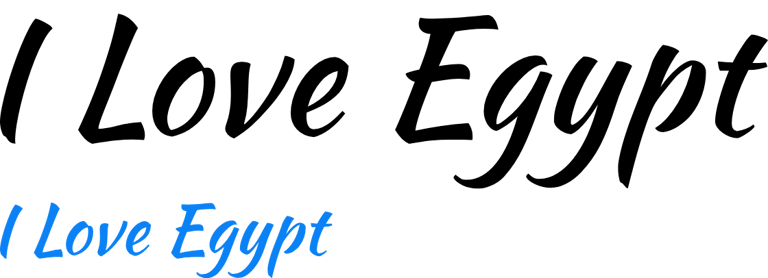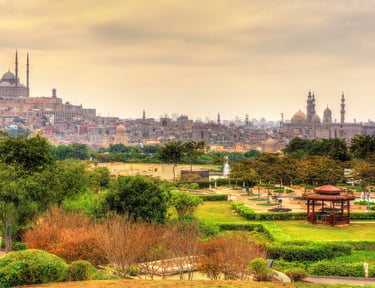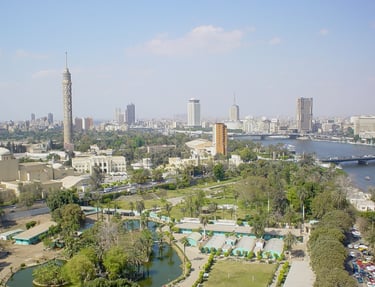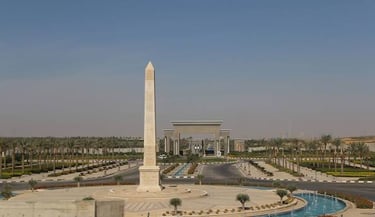Egyptian Culture الثقافة والعادات والتقاليد المصرية
Egyptian culture is a rich and diverse blend of ancient heritage and modern influences, shaped by thousands of years of history, geography, and various civilizations. Central to both its past and present are strong family and community ties, deep-rooted religious traditions, and a distinct artistic legacy.
Ancient Egyptian culture
Life-affirming civilization: Contrary to the popular belief that ancient Egyptians were obsessed with death, their culture was deeply focused on affirming and continuing life, which included a belief in a pleasant afterlife.
The Nile River: The Nile was the foundation of the entire civilization. Its annual floods provided the fertile soil needed for agriculture, which was the backbone of the economy and supported the population.
Religion and afterlife: The belief in the afterlife was a core tenet of ancient Egyptian religion. Elaborate mortuary practices, such as mummification and the construction of monumental tombs like pyramids, were used to preserve the body for the spirit's journey.
Social structure: Ancient Egyptian society was highly stratified. The pharaoh, viewed as a god on Earth, was at the top, followed by a hierarchy of priests, scribes, craftsmen, and farmers. Despite this, all Egyptians were considered equal under the law, and even a peasant could petition the court for justice.
Women's rights: Compared to many other ancient cultures, women in ancient Egypt enjoyed a great degree of freedom and legal rights. They could own property, run businesses, and serve as scribes, priests, or doctors.
Innovation: The ancient Egyptians made significant advances in writing (hieroglyphics), architecture, medicine, and engineering, which are still marveled at today.
Modern Egyptian culture
Islamic and Coptic traditions: The religious landscape is predominantly Sunni Muslim, with a significant Coptic Christian minority. Religious holidays, like Eid and Coptic festivals, are widely celebrated.
Family and community: The family is the most important unit of society, and strong bonds extend to the entire community. It is common for multiple generations to live together or nearby.
Warm hospitality: Egyptians are known for their warmth, friendliness, and hospitality towards guests and strangers. It is customary to offer tea or coffee to guests.
Urban vs. rural life: Lifestyles differ between major cities and the countryside. Urban centers are heavily influenced by global trends, while rural areas, particularly in Upper Egypt, often maintain stronger traditional and tribal identities.
Arts and media: Egyptian television dramas are very popular across the Arab world. The nation also has a rich literary tradition, exemplified by Nobel laureate Naguib Mahfouz, and a thriving art scene.
Cuisine: Egyptian cuisine is a delicious mix of ingredients from the Nile Valley and regional spices. It emphasizes vegetables, legumes, and traditional meat dishes.
Language: The official language is Arabic, and the Egyptian dialect is one of the most widely understood forms throughout the Arab world.
Enduring traditions and characteristics
A fusion of influences: The longevity of Egyptian culture is due to its ability to absorb and integrate elements from the many cultures that have passed through its lands over centuries.
National pride: Egyptians share a strong sense of national identity and are proud of their long, rich history.
Social customs: Social interactions are characterized by expected greetings and close personal space among friends and family. Punctuality is often less important than respecting social connections
Egyptian cuisine
Egyptian cuisine is a vibrant and ancient culinary tradition, influenced by its fertile Nile Valley and historic trade routes. It relies heavily on legumes, vegetables, and rice, though meat and poultry are also common. Bread, particularly the local eish baladi, is a staple of nearly every meal.
Signature dishes
Koshari: Considered by many to be the national dish, this hearty, inexpensive street food layers rice, brown lentils, and macaroni, then tops it with a spicy tomato sauce, chickpeas, and crispy fried onions.
Ful Medames: A traditional breakfast or dinner, this stew of cooked fava beans is mashed and seasoned with olive oil, cumin, and lemon juice. It is often topped with chopped onions, parsley, and tomatoes and served with eish baladi for dipping.
Ta'ameya: The Egyptian version of falafel is made from mashed fava beans and fresh herbs like parsley and cilantro, rather than the chickpeas used in other regions. The patties are typically deep-fried and served in pita bread.
Mulukhiya: A thick, green, and viscous soup made from finely chopped jute leaves cooked in a garlic and coriander sauce. It is often served with rice and a meat broth made from chicken, beef, or rabbit.
Hawawshi: This savory meat pie features seasoned minced beef and chopped onions and peppers stuffed into pita bread or a loaf. It is then baked or grilled until the bread is crispy and golden.
Fatta: A celebratory dish made for special occasions. It consists of layers of crispy bread and rice soaked in a garlic and vinegar-infused meat broth, and topped with chunks of stewed beef or lamb.
Street food and grills
Shawarma: Marinated beef, lamb, or chicken is grilled on a vertical rotisserie, then shaved and served in a warm pita with tahini or garlic sauce, tomatoes, and onions.
Kabab and Kofta: Grilled meats are a street-side favorite. Kabab consists of skewered chunks of marinated lamb or beef, while kofta is spiced minced meat formed into patties or sausages and grilled.
Alexandrian Liver and Sausage: A specialty of Alexandria, this dish features tender slices of beef liver or spiced sausage that are stir-fried with bell peppers, garlic, cumin, and other spices. It is often served in a baguette-like roll called eish fino.
Desserts and sweets
Om Ali: Known as "Ali's Mother," this rich, hot bread pudding is made with layers of puff pastry soaked in milk and sweetened with sugar, coconut, raisins, and nuts.
Basbousa: A semolina cake drenched in sweet syrup and garnished with almonds. It has a moist, crumbly texture and is one of Egypt's most famous desserts.
Kunafa: Made from thin, noodle-like pastry threads, kunafa can be filled with sweet cream or nuts before being baked until golden and soaked in syrup.
Baklava: Layers of phyllo pastry are filled with nuts and drizzled with a sweet syrup. The Egyptian version is known for its flaky texture and delightful sweetness.
Feteer Meshaltet: A flaky, layered pastry that can be served either savory or sweet. For a dessert, it can be filled with honey, cheese, coconut, or pudding
Egyptian Dress Codes
The Egyptian dress code for tourists emphasizes modesty to respect the country's conservative, predominantly Muslim culture
While there are no legally enforced rules for foreigners outside of religious sites, dressing conservatively can help you avoid unwanted attention. Local expectations for attire vary based on location, with more relaxed standards at Red Sea resorts and more conservative ones in cities like Cairo and Luxor.
General guidelines for all visitors
Opt for loose-fitting clothing made of light, breathable fabrics like cotton or linen. This is especially important for staying comfortable during the country's hot, dry climate.
Cover shoulders and knees in public. This applies in cities, rural areas, and when exploring ancient sites like the pyramids and temples.
Carry a scarf or shawl for additional coverage. For women, this is essential for visiting mosques and can be used to cover your shoulders or hair as needed.
Wear comfortable footwear. Many historical sites and city streets are dusty and uneven, so sturdy walking shoes, sneakers, or supportive sandals are a must.
Women's dress code
Tops: Wear loose-fitting blouses or shirts that cover your shoulders and chest. Avoid sleeveless tops, tank tops, and low-cut necklines.
Bottoms: Choose long, loose-fitting trousers, maxi skirts, or dresses that extend past the knee. Tight-fitting clothing like leggings should be worn under a tunic or dress.
Swimwear: Standard bathing suits and bikinis are acceptable at hotel swimming pools and resorts, such as those along the Red Sea. However, it is important to cover up with conservative clothing when leaving the immediate pool or beach area.
Headscarves: Head coverings are not required for female tourists in most public spaces. However, you must cover your hair with a scarf when entering a mosque.
Men's dress code
Tops: T-shirts and collared, short-sleeved shirts are acceptable in public. In more conservative areas, men should avoid tank tops and sleeveless shirts.
Bottoms: While male tourists often wear shorts in warmer areas, many Egyptian men wear long trousers. Consider wearing long pants for city trips and always opt for trousers when visiting mosques.
Religious sites: Men must wear long pants to enter mosques.
Dress code for visiting religious sites
Mosques:
Men: Must wear long trousers.
Women: Must wear loose clothing that covers their arms and legs, along with a headscarf to cover their hair.
Both: Shoes must be removed before entering. Some mosques may provide covering garments (abayas and scarves) at the entrance.
Coptic Churches: A similar modest dress code applies, with visitors covering their arms and legs. Women may want to have a scarf available for their head
Contact IloveEgypt.com
© 2025. All rights reserved.
Mailing address
P.O. Box 690715
Orlando, FL 32869 USA























